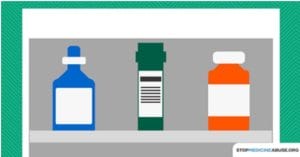Is my teen using medicine from our cabinets?
 Awareness of a problem is the first step to solving it. Parents were recently spreading the word about teen over-the-counter (OTC) cough medicine abuse for National Medicine Abuse Awareness Month. Although October has come and gone, we can still continue to spread awareness and help other parents of teenagers just like us become aware of this serious issue.
Awareness of a problem is the first step to solving it. Parents were recently spreading the word about teen over-the-counter (OTC) cough medicine abuse for National Medicine Abuse Awareness Month. Although October has come and gone, we can still continue to spread awareness and help other parents of teenagers just like us become aware of this serious issue.
While the abuse of OTC medicines doesn’t often receive the same media attention as the abuse of alcohol, marijuana or prescription medications, it’s still a common practice among today’s teens. In fact, one in 25 teenagers reports getting “high” by consuming up to 25 times the suggested amount of cough medicine.
Why the abuse of cough medicine?
Many teens believe that abusing cough medicine is less harmful than using other drugs because it’s legal and easy to attain. Unfortunately, they’re misinformed. Most cough medicine contains the active ingredient dextromethorphan (DXM), which has dangerous effects when taken in excess, such as hallucinations, vomiting, sweating and memory loss. The risks only get worse when DXM is combined with other substances, such as drugs or alcohol.
Here’s another problem. Due to the fact that cough medicine can be obtained easily and inexpensively, it’s an attractive choice for teen users. It’s also much easier to hide from parents. What parent would suspect risky behavior when they see an empty bottle of cough medicine in the trash? Unfortunately, only 50% of parents are aware of DXM abuse at all.
The Stop Medicine Abuse campaign released this short but significant video highlighting one way parents can become more informed and help prevent abuse at home:
The Stop Medicine Abuse icon is included on OTC products, which contain DXM. Even without any knowledge of DXM, this icon alerts parents to stay vigilant about the potential for abuse.
With the hashtag #CheckYourShelf, the video encourages parents to monitor the amount of cough medicine in their home, safeguard their medicine cabinets and safely dispose of old/unused medicines. It also urges parents to check themselves by asking the following questions:
- Am I aware of my teen’s habits and tendencies?
- Do I have the kind of relationship where I can ask my teen important questions around risky behavior?
- How can I start these conversations with my teen?
Informing parents about DMX abuse is the first step in preventing it. As the temperature drops and colds become more frequent, let’s continue to spread awareness about this critical issue, so parents know how the cough medicine in their home is being used.
You can get more information at www.StopMedicineAbuse.com or join the conversation by following Stop Medicine Abuse on Facebook and Twitter.
Contributor: Anita Brikman
Read: 5 Benefits of Therapeutic Boarding Schools.
Read: Success in Therapeutic Boarding Schools.
Read: Why Residential Treatment Works When Home Therapy Fails.
###
Contact us today for a free consultation for your teen and the right therapeutic boarding school.







